最新外研版小学英语四年级下册第三模块重点句型和短语
小学英语四年级下册课本知识点(外研版三年级起点)
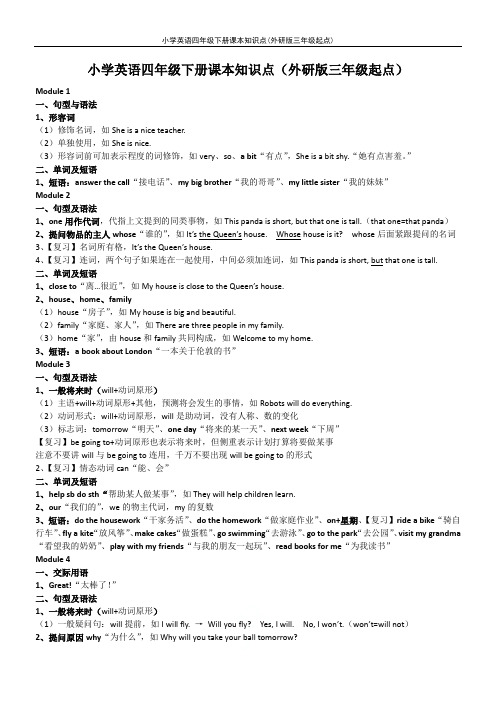
小学英语四年级下册课本知识点(外研版三年级起点)Module 1一、句型与语法1、形容词(1)修饰名词,如She is a nice teacher.(2)单独使用,如She is nice.(3)形容词前可加表示程度的词修饰,如very、so、a bit“有点”,She is a bit shy.“她有点害羞。
”二、单词及短语1、短语:answer the call“接电话”、my big brother“我的哥哥”、my little sister“我的妹妹”Module 2一、句型及语法1、one用作代词,代指上文提到的同类事物,如This panda is short, but that one is tall.(that one=that panda)2、提问物品的主人whose“谁的”,如It’s the Queen’s house. Whose house is it? whose后面紧跟提问的名词3、【复习】名词所有格,It’s the Queen’s house.4、【复习】连词,两个句子如果连在一起使用,中间必须加连词,如This panda is short, but that one is tall.二、单词及短语1、close to“离…很近”,如My house is close to the Queen’s house.2、house、home、family(1)house“房子”,如My house is big and beautiful.(2)family“家庭、家人”,如There are three people in my family.(3)home“家”,由house和family共同构成,如Welcome to my home.3、短语:a book about London“一本关于伦敦的书”Module 3一、句型及语法1、一般将来时(will+动词原形)(1)主语+will+动词原形+其他,预测将会发生的事情,如Robots will do everything.(2)动词形式:will+动词原形,will是助动词,没有人称、数的变化(3)标志词:tomorrow“明天”、one day“将来的某一天”、next week“下周”【复习】be going to+动词原形也表示将来时,但侧重表示计划打算将要做某事注意不要讲will与be going to连用,千万不要出现will be going to的形式2、【复习】情态动词can“能、会”二、单词及短语1、help sb do sth“帮助某人做某事”,如They will help children learn.2、our“我们的”,we的物主代词,my的复数3、短语:do the housework“干家务活”、do the homework“做家庭作业”、on+星期、【复习】ride a bike“骑自行车”、fly a kite“放风筝”、make cakes“做蛋糕”、go swimming“去游泳”、go to the park“去公园”、visit my grandma “看望我的奶奶”、play with my friends“与我的朋友一起玩”、read books for me“为我读书”Module 4一、交际用语1、Great!“太棒了!”二、句型及语法1、一般将来时(will+动词原形)(1)一般疑问句:will提前,如I will fly. →Will you fly? Yes, I will. No, I won’t.(won’t=will not)2、提问原因why“为什么”,如Why will you take your ball tomorrow?(1)回答:Because we are going to have a picnic tomorrow.(2)Why not?“为什么不呢”,Why won’t you do sth?=Why not do sth?eg:Why won’t you take your ball tomorrow? = Why not take your ball tomorrow?3、连词because“因为”、so“所以”,注意英语中because和so不能连用eg:Because we are going to have a picnic tomorrow, I will take my kite.We are going to have a picnic tomorrow, so I will take my kite.【复习】so“如此、这么”,如It is so hot today.4、询问天气What will be the weather?“天气怎么样?”,回答It will be+形容词,如It will be sunny.注意:will后要求加动词原形,am/is/are的原形是be,如It is sunny today. →It will be sunny tomorrow.三、单词及短语1、take“带着、拿着”,如take your kite“带着你的风筝”【复习】take“拍摄”,如take pictures“拍照”2、名词变形容词:sun-sunny、cloud-cloudy、wind-windy3、短语:have a picnic“去野餐”、【复习】in+地点,如in HaikouModule 5一、句型及语法1be动词)(1)主语+be动词过去式+其他,表示过去的情况,如I was two then.“我那时两岁”←I am ten now.“我现在十岁。
外研版小学四年级英语下册第一至三模块重点句型和短语

外研版小学四年级英语下册第一至三模块重点句型和短语[广告](外研版)小学四年级英语下册第一模块重点句型和短语:一、短语1、my friends 我的朋友们2、a bit 一点儿3 、a nice teacher 一位友善的老师4、a clever pupil 一个聪明的小学生5、a very naughty bird 一直非常淘气的鸟儿6、my big brother 我的大兄弟(哥哥)7、my little sister 我的小妹妹8、look at 看.....9、Panpan`s little sister 盼盼的小妹妹10、a little sister 一个小女孩11、a little curl 一小绺鬈发12、a very clever girl 一个非常聪明的女孩13、a very nice boy 一个非常友善的男孩二、句型1、These are my friends.这些是我的朋友。
【These +are+名词复数形式;This+is+名词单数形式】请翻译:这些是猴子。
这是一只猴子。
2、This is Maomao.这是毛毛。
�1�7�1�7向别人介绍某人,用"This is+某人"句型。
】请向我介绍:这是我的小弟弟。
3、She is a bit shy.她有点害羞。
【She is+形容词,"她是..."形容词表示主语的特征、性格等;a bit一点儿,very 和a bit 是表示程度的副词,常放在形容词前,分别表示"非常"和"有一点"。
】练习:他非常酷,但他有点高。
4、She is a nice teacher.她是一位友善的老师。
【某人+is+a/an+形容词+名词单数】5、He`s cool.他(很)酷。
【cool 可表示天气,是"凉爽";表示人,是"酷"的意思。
四年级下册英语外研版第三模块单词
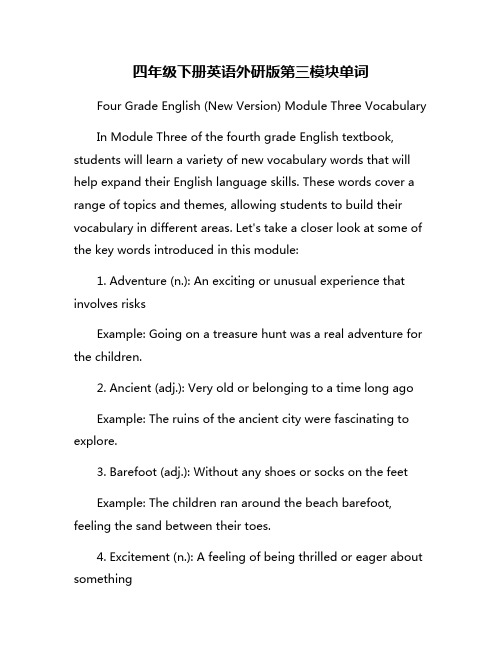
四年级下册英语外研版第三模块单词Four Grade English (New Version) Module Three VocabularyIn Module Three of the fourth grade English textbook, students will learn a variety of new vocabulary words that will help expand their English language skills. These words cover a range of topics and themes, allowing students to build their vocabulary in different areas. Let's take a closer look at some of the key words introduced in this module:1. Adventure (n.): An exciting or unusual experience that involves risksExample: Going on a treasure hunt was a real adventure for the children.2. Ancient (adj.): Very old or belonging to a time long agoExample: The ruins of the ancient city were fascinating to explore.3. Barefoot (adj.): Without any shoes or socks on the feetExample: The children ran around the beach barefoot, feeling the sand between their toes.4. Excitement (n.): A feeling of being thrilled or eager about somethingExample: There was a sense of excitement in the air as the carnival approached.5. Jaw (n.): The bones that form the mouth and hold the teethExample: The dentist examined the patient's jaw to check for any problems.6. Precious (adj.): Highly valuable or much lovedExample: The ring was precious to her as it had belonged to her grandmother.7. Relax (v.): To rest or take it easy after a period of work or activityExample: After a long day at school, she liked to relax by reading a book.8. Remote (adj.): Far away from other places or peopleExample: The village was so remote that it took hours to reach by car.9. Scare (v.): To make someone feel afraid or frightenedExample: The loud noise in the dark alley scared the children.10. Whisper (v.): To speak very quietly so that only the person close by can hearExample: The teacher whispered the instructions to the students during the exam.These are just a few of the new words that students will encounter in Module Three of their English textbook. By learning and practicing these words, students will be able to improve their vocabulary and language skills, helping them to communicate effectively in English.。
新版外研版三起点四年级下学期知识点归纳整理

新版外研版三起点四年级下学期知识点归纳整理一、重点单词:nice 好的,友善的 clever 聪明的 naughty 淘气的a bit 稍微,有一点 shy 害羞的 big年龄较大的little 幼小的,年幼的 cool 酷的 cute 可爱的answer接(电话) call电话;打电话 bad不好的,坏的aunt姨母;姑母;舅母;伯母;婶母uncle伯父;叔父;舅父;姑父;姨夫二、重点短语:a nice teacher一位好老师 a bit shy有点害羞a clever pupil一个聪明的小学生三、重点句型:1. This is Ms Smart. She is a nice teacher. 这是斯玛特女士,她是一位友善的老师.2. Parrot is very naughty!But he’s not a bad bird.帕罗特很调皮,但是他不是一直坏鸟.3.This is Xiaoyong. He’s a clever pupil.这是小勇,它他一个聪明的小学生.4. This is my aunt. She is very nice.这是我姨母,她很好友善.5. These are my friends. 这些是我的朋友.(注意复数形式)6. A:Can you answer the call now?你现在能接电话了嘛?B: Yes, I can.\No, I can’t.是的,我是不,我不.(注意情景连线)新版外研版(三起点)四年级下学期第二模块复习重难点一、重点单词:city城市 ship船 beautiful美丽的whose谁的 queen女王 close近的,接近的old年代久远的,古老的 famous著名的二、重点短语:a big city一座大城市 close to靠近,临近Buckingham Palace白金汉宫 Big Ben大本钟Hyde Park 海德公园 Tower Bridge塔桥三、重点句型:1. London is a big city. 伦敦是一座大城市.2.My house is very small, but it’s beautiful.我的房子很小但是很漂亮.3. This is a book about London. 这是一本关于伦敦的书.4. It’s very big and very beautiful.它既大又漂亮.5. A: What’s this? 这是什么?B: It’s a book about London.这是一本关于伦敦的书.(情景连线)6. A: Whose house is it?这是谁的房子?B: It’s the Queen’s house. 它是女王的房子.(情景连线)新版外研版(三起点)四年级下学期第三模块复习重难点一、重点单词:robot 机器人 will将,将会 everything 所有事情one day (将来)有一天 housework 家务 learn 学习our 我们的 homework 家庭作业 Monday 星期一Tuesday星期二 Wednesday星期三 Thursday星期四Friday星期五 Saturday星期六 Sunday星期日have有,拥有 next下一个 week星期,周holiday假期二、重点短语:ride a bike骑自行车 fly a kite放风筝do the housework 做家务 make cakes 做蛋糕help children learn 帮助孩子学习 do homework做家庭作业go swimming去游泳 next week下周play with my friends和我的朋友玩耍 visit my grandma 看望我奶奶play football踢足球 play basketball打篮球row a boat划船 take pictures 照相go to the park去公园 help my mother帮助我妈妈read books读书 on Monday在星期一三、重点句型:1. One day, robots will do everything.总有一天,机器人会做一切事情.2. They will do the housework. 它们会做家务.3. They will do our homework too. 它们也会做我们的家庭作业.3. Robots will help children learn.机器人会帮助孩子们学习.4. A: What’s that? 那是什么?B: It’s a robot.是个机器人.(情景连线)5. On Monday I’ll go swimming.星期一我要去游泳.6. On Tuesday I’ll play with my friends.星期二我要和朋友一起玩耍.7. A: What will you do on Sunday?你星期天干什么?B: I’ll go to the park.我要去公园.(情景连线)8. Today is Monday and tomorrow is Tuesday.今天是星期一,明天是星期二.新版外研版(三起点)四年级下学期第四模块复习重难点一、重点单词:take 带走,拿走 fly飞 picnic 野餐great 太好了 why 为什么 Why not?为什么不呢?because 因为 so所以 cloudy多云的weather 天气二、重点短语:on Saturday 在周六 have a picnic 野餐take your ball带着你的球 go swimming去游泳三、重点句型:1. A: Will you take your kite on Saturday? 星期六你会带着你的风筝吗? B: Yes, I will take my kite and my football on Saturday.是的,周六我会带着我的风筝和我的足球.(注意情景连线)2. On Saturday we’re going to have a picnic. 星期六我们要去野餐.3. A: Will you take your ball tomorrow?你明天会带着你的球吗?B: No, I won’t.不,我不带.(注意情景连线)4. A: Why not? 为什么不呢?B:Because tomorrow is Friday.因为明天是周五.(注意情景连线)5. Will it be hot in Haikou?海口会很热吗?6. It will be windy in Beijing.北京将会有风.新版外研版(三起点)四年级下学期第五模块复习重难点一、重点单词:was(is ,am过去式)是 then当时,那时grandparent祖父;祖母;外祖父;外祖母were(are过去式)是 young年轻的old老的,年老的 hair头发 so这么,那么不是short短的 long长的wasn’t不是 clean干净的 dirty脏的weren’t二、反义词:tall高的----short矮的 big大的----small小的old老的---young年幼的 fat胖的---thin瘦的clean干净的---dirty脏的 long长的----short短的三、重点句型:1.I was two then.我那时候两岁.2. They were young then.他们那时候很年轻.3. Your hair was so short.那时候你的头发那么短啊.4.But I was very naughty too.但是我那时候也很淘气.5.They wasn’t old then.他们那时候不老.6.A: Who are they?他们是谁?B: They are my grandparents.他们是我的爷爷奶奶.(情景连线)7. A: Who is that little girl?那个小女孩是谁?B: It’s me.是我.(情景连线)新版外研版(三起点)四年级下学期第六模块复习重难点一、重点单词:yesterday昨天 out不在家;在外面 well健康的thanks谢谢 sun太阳 lesson一节课,一堂课village乡村,村子二、重点短语:at school在学校 at the zoo在动物园at the park在公园 in London在伦敦in the sun在阳光下 at home在家Chinese lesson汉语课 a big city一座大城市三、重点句型:1.A: Were you at home yesterday?昨天你在家吗?B:No, I wasn’t.不,我没在家.(情景连线)2. A: Are you at home now?你现在在家吗?B: Yes, I am.是的,我在家.(情景连线)3. A: Is it sunny in London?伦敦天气晴朗吗?不,没有.(情景连线)B: No, it isn’t.4. A: Was it sunny in London yesterday?昨天伦敦天气好吗?B: Yes, it was.是的,很好.(情景连线)5.I was out with Grandpa for our Chinese lesson.我昨天和爷爷去上语文课了.6. I want to play in the sun.我想到阳光下玩耍.7.A: Was it a big city then?那时它是一座大城市吗?B: No, it was a very small village then.不,它那时候是一座很小的村庄.(情景连线)8. Shenzhen is a big city now.深圳现在是一座大城市.9. The park was small then.这个公园那时候很小.10. The street was old then.这条街那时候很破旧.11. A: How are you?你好吗?B: Very well, thank you.很好,谢谢.(情景连线)12. A: Where is he?他在那里?B: He is in Shenzhen.他在深圳.(情景连线)13. A: Is it Beijing?它是北京吗?B: Yes, it is.是的,它是.(情景连线)新版外研版(三起点)四年级下学期第七模块复习重难点一、重点单词:had度过(have过去) phone(给….)打电话cook烹调;煮;烧 really真的 wash洗What about…?...怎么样? did(do的过去式)助动词love爱;喜欢didn’t=did not没有电脑;计算机 him(宾格)他Mrs 太太,夫人 Miss小姐二、重点短语:row a boat划船 on the lake在湖上on Monday在周一 wash clothes洗衣服玩电脑 watch TV看电视in the park在公园里 talk with some friends和一些朋友聊天play basketball打篮球 play table tennis打乒乓球last Sunday上周天 listen to music听音乐play football踢足球 talk with和…聊天walk with和…散步三、重点句型:1. We rowed a boat on the lake.我们在湖上划船.2. We all had a very happy day. 我们玩的很开心.3. I cooked noodles yesterday.我昨天做的面条.4. You are a good girl.你是一个好女孩.5.He played and he watched TV.他玩电脑看电视了.6. I phoned Grandma yesterday.我昨天给奶奶打电话了.7.Grandma and Grandpa walked in the park.爷爷和奶奶在公园里散步.8.They talked with some friends.他们和一些朋友聊天了.9. A: What did they do last Sunday?上周天他们干什么了?B: They cooked fish.他们做鱼了.(情景连线)新版外研版(三起点)四年级下学期第八模块复习重难点一、重点单词:beautifully优美地;动听地 game游戏;比赛last最近过去的 fun有趣的事there在那儿,往那里 drink饮料time一段时间 busy忙的,忙碌的tell告诉,告知 great非常好的,令人愉快的delicious美味的,可口的 poster海报,招贴画二、重点短语及知识点:sing(过去式)sang see(过去式)sawgo(过去式)went eat(过去式)atedrink(过去式)drank take(过去式)tookmake(过去式)made play(过去式)playedhave(过去式)had is\am(过去式) washave a picnic(翻译)野餐 last Sunday(翻译)上周天by bus(翻译)乘公共汽车 play games(翻译)玩游戏have a good time(翻译)玩的开心 in the park(翻译)在公园里listen to music(翻译)听音乐 have a busy day(翻译)忙碌的一天by bike(翻译)骑自行车 lots of(翻译)许多,大量tell me about…(翻译)告诉我关于….的事take pictures(翻译)照相 make a poster(翻译)制作海报go swimming(翻译)去游泳 go to the supermarket(翻译)去超市do homework(翻译)做作业三、重点句型:1. We had a picnic last Sunday.上周天我们野餐了.2. We went there by bus.我们乘公交车去的那里.3. I cooked noodles yesterday.我昨天做的面条.4. We ate some food and drank some drinks.我们吃了一些食物喝了一些饮料.5.You had a good time.你们玩的很开心.6. You had a busy day.你们过了忙碌的一天.7.Amy went to school by bike.艾米骑自行车去上学.8.We ate lots of delicious food.我们吃了许多美味的事物.新版外研版(三起点)四年级下学期第九模块复习重难点一、重点单词:欢迎 postcard明信片 cousin表兄弟;表姐妹dear亲爱的 travel旅行;游历 came(的过去式)来pop流行音乐的 concert音乐会 earth地球二、重点短语及知识点:欢迎来中国! by plane乘坐飞机in the US在美国 last year去年in New York在纽约 on holiday在休假,在度假pop concert流行音乐会 last week上周a basketball game一场篮球比赛 play basketball打篮球at school在学校 West Lake西湖the school concert学校音乐会 lots of许多do(过去式)did did (否定形式)didn’tlive(过去式)lived 过去式)camego(过去式)went play(过去式)playedis(过去式)was三、重点句型:by plane?你乘坐飞机来的吗?2. It’s a postcard from my cousin Dalong.这是我堂兄大龙寄来的明信片.3. A: Does he live in New York?他住在纽约吗?B: Yes, he does.\No, he doesn’t. 是的,他住在纽约不,他不住在纽约.(情景连线)4. A: Did he live in New York last year?他去年住在纽约吗?B: Yes, he did. \No, he didn’t.是的,他住过不,他没住过.5. I’m on holiday in New York.我在纽约度假.6. Did he travel by plane?他坐飞机旅行?B: Yes, he did.\No, he didn’t.是的,他坐飞机旅行不,他不做飞机旅行.(情景连线)7. I went to a pop concert and a basketball game last week.上周我去了一个流行音乐会,看了一场篮球比赛.8. A: Did you have a nice holiday, Xiaoyong?小勇,你假期过得愉快吗?B: Yes, I did.\No, I didn’t. 是的,很愉快不,不愉快.(情景连线)9. Did you visit the famous West Lake?你游览了著名的西湖了吗?10. A: Did you see your friend Lili in Hangzhou?你在杭州见到你的朋友丽丽了吗?B: No, she was on holiday in Shanghai. 没有,她在上海度假.(情景连线)11. I went to a village last year.去年我去了一个村庄.12. A: Did you go to Beijing last year?你去年去北京了吗?B: No, I didn’t. I went to New York.不,我没去.我去了纽约.(情景连线)新版外研版(三起点)四年级下学期第十模块复习重难点一、重点单词:fall掉下;落下 fall off跌落 fall down摔倒;跌倒town城镇;市镇 happen发生 ride骑车then然后 thirsty口渴的 water水bump撞伤 hospital医院 chocolate巧克力stomach ache胃痛 cold感冒 headache头痛fever发烧二、重点短语及知识点:fall(过去式)fell find(过去式)foundbuy(过去式)bought carry(过去式)carriedhave(过去式) had fell(过去式)feltup the hill上山 ride a bike骑自行车lots of许多 on the bike在自行车上have a picnic野餐 play games玩游戏all the day一整天 go to the doctor去看医生last Sunday上周天 get up起床三、重点句型:1. A: What happened to your head?你头怎么了?B: I bumped my head.我磕着我的头了.(情景连线)2. Sam and I went for a bike ride yesterday.我昨天和山姆去骑自行车了.3. A: Did you buy some water?你们买水了吗?B: Yes, we did.\No, we didn’t. 是的,我们买了不,我们没买.4. Sam carried the watermelon on the bike.山姆把西瓜放在自行车上.5. Then he took me and the watermelon to the hospital. 然后他把我和西瓜带到了医院.6. A:Did you fall off your bike?你从自行车上掉下来了吗?B: Yes, I did.\No, I didn’t.是的,我掉下来了不,我没掉下来.7.Sam had lots of chocolate.山姆吃了许多巧克力.8. We played games all the day.我们一整天都在玩游戏.9. Daming had two watermelons yesterday, so today he’s got a stomachache. 大明昨天吃了两个西瓜,所以今天肚子疼.。
四年级下册英语素材-Module3知识点归纳外研版(一起)
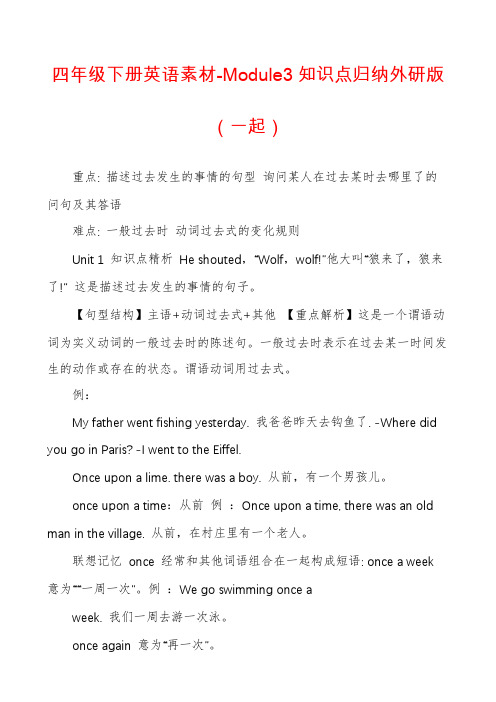
四年级下册英语素材-Module3知识点归纳外研版(一起)重点: 描述过去发生的事情的句型询问某人在过去某时去哪里了的问句及其答语难点: 一般过去时动词过去式的变化规则Unit 1 知识点精析He shouted,“Wolf,wolf!”他大叫“狼来了,狼来了!” 这是描述过去发生的事情的句子。
【句型结构】主语+动词过去式+其他【重点解析】这是一个谓语动词为实义动词的一般过去时的陈述句。
一般过去时表示在过去某一时间发生的动作或存在的状态。
谓语动词用过去式。
例:My father went fishing yesterday. 我爸爸昨天去钩鱼了. -Where did you go in Paris? -I went to the Eiffel.Once upon a lime. there was a boy. 从前,有一个男孩儿。
once upon a time:从前例:Once upon a time, there was an old man in the village. 从前,在村庄里有一个老人。
联想记忆once 经常和其他词语组合在一起构成短语: once a week 意为““一周一次"。
例:We go swimming once aweek. 我们一周去游一次泳。
once again 意为“再一次”。
例:Can you read it once again? 你能再读一遍吗?at once 意为"立刻;马上"。
Do it at once! 马上去做!一般过去时(1)定义:一般过去时表示在过去回某一时间发生的动作或存在的状态,常和yesterday(昨天),ago(以前),last night(昨晚),last year(去年)等表示过去的时间状语连用。
(2)一般过去时的各种句式①肯定句主语+was/were/动词过去式+其他例:I watched TV yesterday. 我昨天看电视了。
(完整版)最新外研版小学四年级英语下册知识点归纳复习
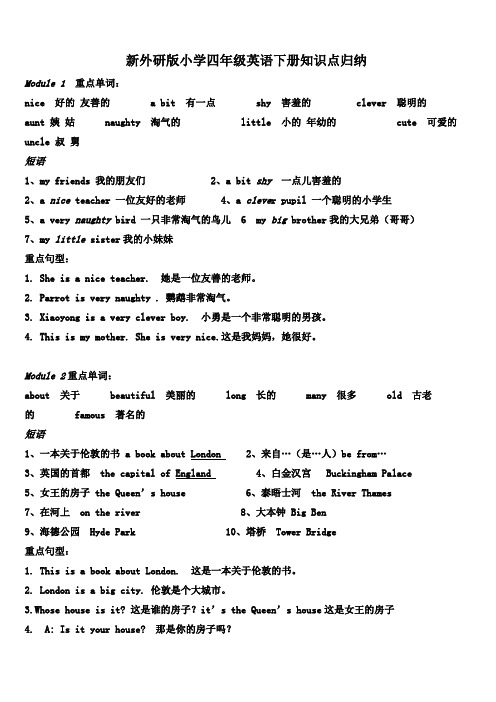
新外研版小学四年级英语下册知识点归纳Module 1 重点单词:nice 好的友善的 a bit 有一点 shy 害羞的clever 聪明的aunt 姨姑 naughty 淘气的 little 小的年幼的 cute 可爱的uncle 叔舅短语1、my friends 我的朋友们2、a bit shy 一点儿害羞的2、a nice teacher 一位友好的老师 4、a cleve r pupil 一个聪明的小学生5、a very naughty bird 一只非常淘气的鸟儿 6 my big brother我的大兄弟(哥哥)7、my little sister我的小妹妹重点句型:1. She is a nice teacher. 她是一位友善的老师。
2. Parrot is very naughty . 鹦鹉非常淘气。
3. Xiaoyong is a very clever boy. 小勇是一个非常聪明的男孩。
4. This is my mother. She is very nice.这是我妈妈,她很好。
Module 2重点单词:about 关于beautiful 美丽的long 长的many 很多old 古老的famous 著名的短语1、一本关于伦敦的书 a book about London2、来自…(是…人)be from…3、英国的首都 the capital of England4、白金汉宫 Buckingham Palace5、女王的房子 the Queen’s house6、泰晤士河 the River Thames7、在河上 on the river 8、大本钟 Big Ben9、海德公园 Hyde Park 10、塔桥 Tower Bridge重点句型:1. This is a book about London. 这是一本关于伦敦的书。
2. London is a big city. 伦敦是个大城市。
外研版一起点四年级下册Unit 3知识点汇总
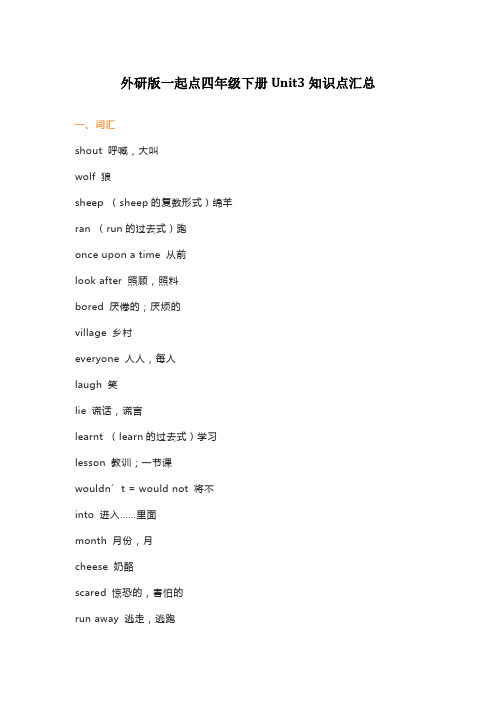
外研版一起点四年级下册Unit3知识点汇总一、词汇shout 呼喊,大叫wolf 狼sheep (sheep的复数形式)绵羊ran (run的过去式)跑once upon a time 从前look after 照顾,照料bored 厌倦的;厌烦的village 乡村everyone 人人,每人laugh 笑lie 谎话,谎言learnt (learn的过去式)学习lesson 教训;一节课wouldn’t = would not 将不into 进入……里面month 月份,月cheese 奶酪scared 惊恐的,害怕的run away 逃走,逃跑二、句子1. The sheep ran up the hill. 绵羊跑上山。
2. The wolf ran down the hill. 狼跑下山。
3. The boy was bored. 那个男孩厌倦了。
4. The boy ran to the village again. 男孩再次跑向村子。
5. He shouted: “Wolf, wolf!”他喊道:“狼来了,狼来了!”6. Once upon a time, there was a boy. 很久以前,有一个男孩。
7. He looked after sheep every day. 他每天照顾着山羊。
8. The boy learnt a lesson and wouldn’t tell lies again. 男孩得到一个教训,再也不说谎了。
9. Where did you go yesterday? 你昨天去哪了?10. I went to the shop. 我去商店了。
11. She was scared and ran away. 她很害怕然后逃跑了。
12. She bought some cheese and she ate the cheese. 她买了一些奶酪,而且把它们吃了。
外研版四年级英语下册第三单元重点句型

外研版四年级英语下册第三单元重点句型
2. o’clock 一般用来表示整点。
例:nine o’clock 9点整
课本P20页出现了a.m.与p.m. 的用法,a.m.指上午,p.m.指下午。
3. It’s time for +某一门课程,例:It’s time for English class/ Chinese class/music class.…
4. 新PEP小学英语四年级下册Unit 3知识点:It’s time to+动词短语,例:It’s time to go to school/ go home /go to bed.……
5. This……这个…… These……这些……
This is +单数短语,译为:这是……。
例:This is my T-shirt. 这是我的T恤衫。
These are+复数短语,译为:这些是……。
例:These are my shoes. 这些是我的鞋子。
6. That……那个……Those……那些……
That is +单数短语,译为:那是……。
例:That is my dress. 那是我的连衣裙。
Those are+复数短语,译为:那些是……。
例:Those are my jeans. 那些是我的牛仔裤。
7. socks, shoes, pants, jeans, shorts 这五个单词,一般情况下均以复数形式出现(即后面要加S),切记。
网络搜集整理,仅供参考
1/ 1。
北塘区某小学四年级英语下册 Module 3重点知识 外研版三起
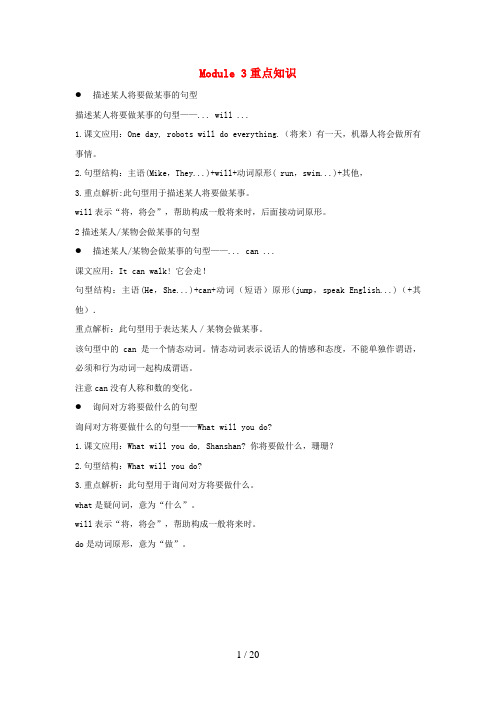
Module 3重点知识●描述某人将要做某事的句型描述某人将要做某事的句型——... will ...1.课文应用:One day, robots will do everything.(将来)有一天,机器人将会做所有事情。
2.句型结构:主语(Mike,They...)+will+动词原形( run,swim...)+其他,3.重点解析:此句型用于描述某人将要做某事。
will表示“将,将会”,帮助构成一般将来时,后面接动词原形。
2描述某人/某物会做某事的句型●描述某人/某物会做某事的句型——... can ...课文应用:It can walk! 它会走!句型结构:主语(He,She...)+can+动词(短语)原形(jump,speak English...)(+其他).重点解析:此句型用于表达某人/某物会做某事。
该句型中的can是一个情态动词。
情态动词表示说话人的情感和态度,不能单独作谓语,必须和行为动词一起构成谓语。
注意can没有人称和数的变化。
●询问对方将要做什么的句型询问对方将要做什么的句型——What will you do?1.课文应用:What will you do, Shanshan? 你将要做什么,珊珊?2.句型结构:What will you do?3.重点解析:此句型用于询问对方将要做什么。
what是疑问词,意为“什么”。
will表示“将,将会”,帮助构成一般将来时。
do是动词原形,意为“做”。
It’s time to get upUnit Two My schoolbag单元整体分析本单元是义务教育人教版(pep)小学英语教科书四年级上册第二单元。
单元主题为My schoolbag(我的书包)。
主情景图展示了校园里为希望工程捐赠的情景,来呈现本单元要学习的主题:描述书包的颜色并说出书包里的课本以及其他物品的名称。
A部分共三页,分三课时。
第一课时为情景对话和练习部分。
Let’s talk活动中Amy 向陈杰展示了自己的新书包,并介绍了书包里装的物品名称。
外研版小学四年级英语下册第一到十模块重点句型

(外研版)小学四年级英语下册第一模块重点句型1、These are my friends.这些是我的朋友。
【These +are+名词复数形式;This+is+名词单数形式】请翻译:这些是猴子。
这是一只猴子。
2、This is Maomao.这是毛毛。
【向别人介绍某人,用“This is+某人”句型。
】请向我介绍:这是我的小弟弟。
3、She is a bit shy.她有点害羞。
【She is+形容词,“她是…”形容词表示主语的特征、性格等;a bit 一点儿,very和a bit是表示程度的副词,常放在形容词前,分别表示“非常”和“有一点”。
】练习:他非常酷,但他有点高。
4、She is a nice teacher.她是一位友善的老师。
【某人+is+a/an+形容词+名词单数】5、He`s cool.他(很)酷。
【cool 可表示天气,是“凉爽”;表示人,是“酷”的意思。
】6、She has a little curl.她有一小绺鬈发。
【a little修饰不可数名词,表示“一点儿”。
】7、Are you naughty ?Yes,I am./No,I am not.你淘气吗?是的,我淘气。
/不,我不淘气。
练习:他聪明吗?不,不聪明。
Keys: 1、These are monkeys . This is a monkey .2、This ia my little brother .3、He`s very cool ,but he`s a bit tall .7、Is he clever ?No ,he isn`t .(外研版)小学四年级英语下册第二模块重点句型1、What`s this ? 这是什么?【其答句要用“It`s”开头的句子。
】如:What`s this ? It`s a dog .你来说:这是什么?这是一头大象。
2、It`s a book about London . 它是一本关于伦敦的书。
最新外研版小学英语四年级下册第三模块重点句型和短语

最新外研版小学英语四年级下册第三模块重点句型和短语小学四年级英语下册第三模块重点句型和短语:一、短语:1、be(am /is/are)going to +动词原形【表示“打算、准备、将要做某事”】2、on Saturday 在星期六3、have a picnic 举行、进行野餐4、will +动词原形【表示将要做某事】5、take your kite 带上你的风筝【take one`s sth.带上某人的东西】6、go swimming 去游泳7、next week 下周8、a holiday 一个假期 9、play with my friends和我的朋友玩10、go to the park 去公园 11、do my(one`s) homework 做我的(某人的)作业12、visit my grandma 拜访我的奶奶 13、help my mother 帮助我妈妈(做家务)14、read my books 看我的书 15、lots of rules 许多规则(定)16、let`s start again 让我们在开始吧二、句型1、On Saterday we`re going to have a picnic .星期六我们准备去野餐。
【星期前面用介词on】练习:星期天我打算看电视。
2、Will you take your kite tomorrow?Yes,I will/No,I won`t.明天你将带风筝去吗?是的,我将带。
不,我不会的。
【will的一般疑问句及肯、否定回答】练习:星期一你将要打篮球吗?是的,我将不打。
3、Why not ? Because tomorrow is Friday.为什么不呢?因为明天是星期五。
【Why 引导的问句,回答要用beacause开头的句子。
】再如:Why not ? Becausemy dog is lost .为什么不呢?因为我的狗丢了。
4、So I will take my kite and my ball on Saterday.因此星期六我将带风筝和球。
外研版四年级英语下册Module 3 谈论将要发生的事情
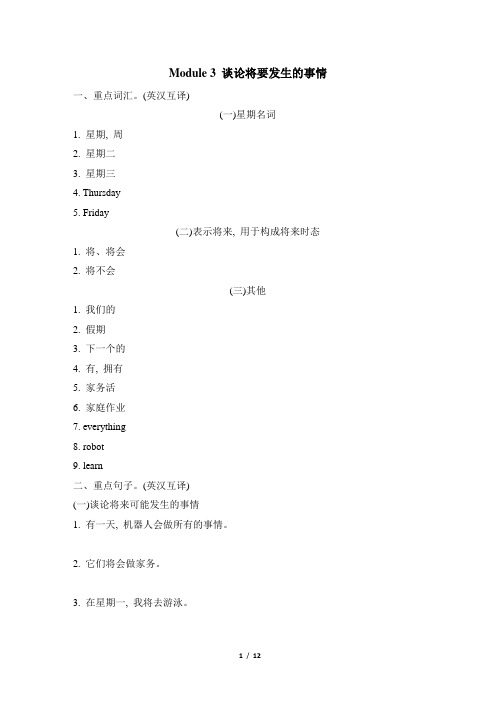
Module 3 谈论将要发生的事情一、重点词汇。
(英汉互译)(一)星期名词1. 星期, 周________________________________________________________2. 星期二________________________________________________________3. 星期三________________________________________________________4. Thursday________________________________________________________5. Friday________________________________________________________(二)表示将来, 用于构成将来时态1. 将、将会________________________________________________________2. 将不会________________________________________________________(三)其他1. 我们的________________________________________________________2. 假期________________________________________________________3. 下一个的________________________________________________________4. 有, 拥有________________________________________________________5. 家务活________________________________________________________6. 家庭作业________________________________________________________7. everything________________________________________________________8. robot________________________________________________________9. learn________________________________________________________二、重点句子。
外研版英语四年级下册全册单词短语和句型知识点汇总
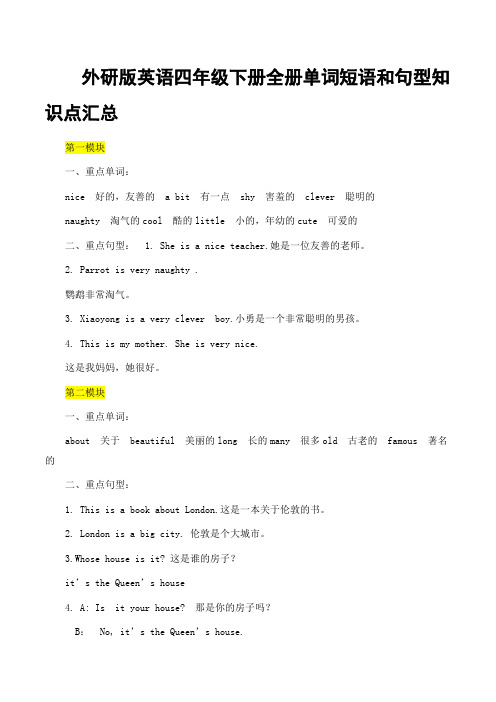
外研版英语四年级下册全册单词短语和句型知识点汇总第一模块一、重点单词:nice 好的,友善的 a bit 有一点shy 害羞的clever 聪明的naughty 淘气的cool 酷的little 小的,年幼的cute 可爱的二、重点句型: 1. She is a nice teacher.她是一位友善的老师。
2. Parrot is very naughty .鹦鹉非常淘气。
3. Xiaoyong is a very clever boy.小勇是一个非常聪明的男孩。
4. This is my mother. She is very nice.这是我妈妈,她很好。
第二模块一、重点单词:about 关于beautiful 美丽的long 长的many 很多old 古老的famous 著名的二、重点句型:1. This is a book about London.这是一本关于伦敦的书。
2. London is a big city. 伦敦是个大城市。
3.Whose house is it? 这是谁的房子?it’s the Queen’s house4. A: Is it your house? 那是你的房子吗?B:No, it’s the Queen’s house.不,那是女王的房子。
(情景连线)5. This is Hyde Park.It’s very beautiful.这是海德公园,它非常漂亮。
第三模块一、重点单词:robot 机器人everything 所有事情one day (总)有一天housework 家务learn 学习our 我们的Monday 星期一Tuesday星期二Wednesday星期三Thursday星期四Friday星期五Saturday星期六Sunday星期日二、重点短语:do the housework 做家务help children learn 帮助孩子学习make cakes 做蛋糕do homework 做作业go swimming 去游泳Play with my friend 和朋友一起玩 go to the park 去公园visit grandma 看望奶奶help mother 帮妈妈(做家务)read books 看书三、重点句型:1. One day,robots will do everything.总有一天,机器人会做一切事情。
外研社小学英语四年级unit3知识点归纳
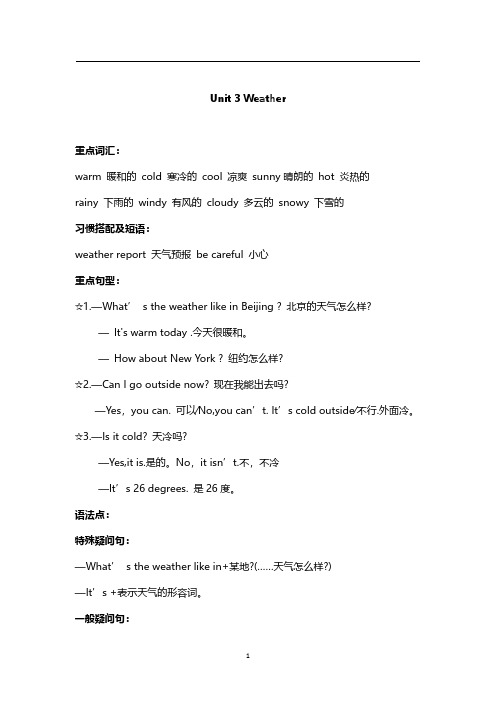
Unit3Weather重点词汇:warm暖和的cold寒冷的cool凉爽sunny晴朗的hot炎热的rainy下雨的windy有风的cloudy多云的snowy下雪的习惯搭配及短语:weather report天气预报be careful小心重点句型:☆1.—What’s the weather like in Beijing?北京的天气怎么样?—It's warm today.今天很暖和。
—How about New York?纽约怎么样?☆2.—Can I go outside now?现在我能出去吗?—Yes,you can.可以∕No,you can’t.It’s cold outside∕不行.外面冷。
☆3.—Is it cold?天冷吗?—Yes,it is.是的。
No,it isn’t.不,不冷—It’s26degrees.是26度。
语法点:特殊疑问句:—What’s the weather like in+某地?(……天气怎么样?)—It’s+表示天气的形容词。
一般疑问句:Can I+动词原形?(我能……?)肯定回答:Yes,you can.否定回答:No,you can’t.一、对应词:close—open put on—take off cold—hot warm—cool复数形式:foot—feet(脚)二、表示天气的几个形容词都是同是由相应的名词变化而来的,它们的对应形式是:名词形式形容词形式rain雨rainy下雨的snow雪snowy下雪的wind风windy有风的cloud云cloudy有云的sun阳光sunny晴朗的三、一般疑问句Can you…?的回答形式有两种,肯定回答是:Yes,I can.否定回答是:No,I can’t.一般疑问句Can I…?的回答形式也有两种,肯定回答是:Yes,you can.否定回答是:No,you can’t.四、同义词:How about…?===What about…?……怎么样?五、当问某个地方的天气如何时,要用What’s the weather like in+地名?如:What’s the weather like in Beijing?北京的天气怎么样?。
外研版(三起)四年级英语下册单元知识小结汇总 Module 3
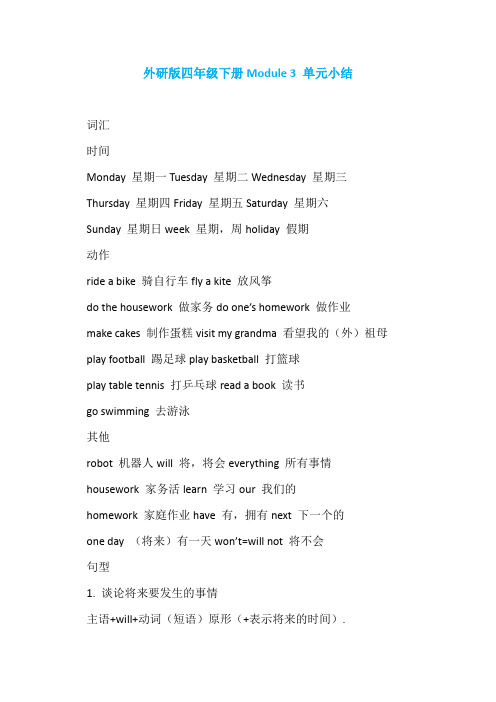
外研版四年级下册Module 3 单元小结
词汇
时间
Monday 星期一Tuesday 星期二Wednesday 星期三Thursday 星期四Friday 星期五Saturday 星期六
Sunday 星期日week 星期,周holiday 假期
动作
ride a bike 骑自行车fly a kite 放风筝
do the housework 做家务do one’s homework 做作业
make cakes 制作蛋糕visit my grandma 看望我的(外)祖母play football 踢足球play basketball 打篮球
play table tennis 打乒乓球read a book 读书
go swimming 去游泳
其他
robot 机器人will 将,将会everything 所有事情housework 家务活learn 学习our 我们的
homework 家庭作业have 有,拥有next 下一个的
one day (将来)有一天won’t=will not 将不会
句型
1. 谈论将来要发生的事情
主语+will+动词(短语)原形(+表示将来的时间).
·Robots will do everything. 机器人将会做所有事情。
·I’ll go swimming on Monday. 星期一我要去游泳。
2. 谈论对方将要做什么
—What will you do+表示将来的时间?
—I’ll+动词(短语)原形.
·—What will you do on Sunday?星期日你将做什么?—I’ll play football. 我将要踢足球。
2019最新外研版英语四年级下册 Module 3 重点知识
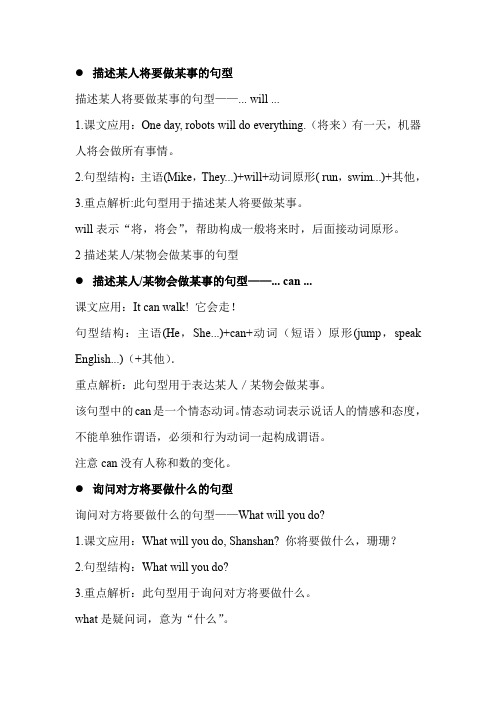
●描述某人将要做某事的句型
描述某人将要做某事的句型——... will ...
1.课文应用:One day, robots will do everything.(将来)有一天,机器人将会做所有事情。
2.句型结构:主语(Mike,They...)+will+动词原形( run,swim...)+其他,
3.重点解析:此句型用于描述某人将要做某事。
will表示“将,将会”,帮助构成一般将来时,后面接动词原形。
2描述某人/某物会做某事的句型
●描述某人/某物会做某事的句型——... can ...
课文应用:It can walk! 它会走!
句型结构:主语(He,She...)+can+动词(短语)原形(jump,speak English...)(+其他).
重点解析:此句型用于表达某人/某物会做某事。
该句型中的can是一个情态动词。
情态动词表示说话人的情感和态度,不能单独作谓语,必须和行为动词一起构成谓语。
注意can没有人称和数的变化。
●询问对方将要做什么的句型
询问对方将要做什么的句型——What will you do?
1.课文应用:What will you do, Shanshan? 你将要做什么,珊珊?
2.句型结构:What will you do?
3.重点解析:此句型用于询问对方将要做什么。
what是疑问词,意为“什么”。
will表示“将,将会”,帮助构成一般将来时。
do是动词原形,意为“做”。
- 1、下载文档前请自行甄别文档内容的完整性,平台不提供额外的编辑、内容补充、找答案等附加服务。
- 2、"仅部分预览"的文档,不可在线预览部分如存在完整性等问题,可反馈申请退款(可完整预览的文档不适用该条件!)。
- 3、如文档侵犯您的权益,请联系客服反馈,我们会尽快为您处理(人工客服工作时间:9:00-18:30)。
小学四年级英语下册第三模块重点句型和短语:
一、短语:
1、be(am /is/are)going to +动词原形【表示“打算、准备、将要做某事”】
2、on Saturday 在星期六
3、have a picnic 举行、进行野餐
4、will +动词原形【表示将要做某事】
5、take your kite 带上你的风筝【take one`s sth.带上某人的东西】
6、go swimming 去游泳
7、next week 下周
8、a holiday 一个假期 9、play with my friends和我的朋友玩
10、go to the park 去公园 11、do my(one`s) homework 做我的(某人的)作业
12、visit my grandma 拜访我的奶奶 13、help my mother 帮助我妈妈(做家务)
14、read my books 看我的书 15、lots of rules 许多规则(定)
16、let`s start again 让我们在开始吧
二、句型
1、On Saterday we`re going to have a picnic .星期六我们准备去野餐。
【星期前面用介词on】
练习:星期天我打算看电视。
2、Will you take your kite tomorrow?Yes,I will/No,I won`t.明天你将带风筝去吗?是的,我将带。
不,我不会的。
【will的一般疑问句及肯、否定回答】练习:星期一你将要打篮球吗?是的,我将不打。
3、Why not ? Because tomorrow is Friday.为什么不呢?因为明天是星期五。
【Why 引导的问句,回答要用beacause开头的句子。
】再如:Why not ? Because
my dog is lost .为什么不呢?因为我的狗丢了。
4、So I will take my kite and my ball on Saterday.因此星期六我将带风筝和球。
5、Next week is a holiday.下周是假期。
练习:明天是假期。
6、What will you do ,Shanshan?On Monday I`ll go simming .珊珊,你打算做什么?星期一我去游泳。
7、What will Shanshan do on Monday?星期一珊珊将要干什么?【will的特殊疑问句】
练习:你星期二将要干什么?
8、Today is Monday and tomorrow is Tuesday.今天是星期一,明天是星期二。
9、Will you play football on Monday?Yes,I will/No,I won`t.星期一你将踢足球吗?是的,我会。
/不,我不会。
【will可以应用于各种人称,其形式不变。
】Keys: 1、On Sunday I am going to watch TV .
2、Will you play basketball ? No ,I won`t .
5、Tomorrow is a holiday .
7、What will you do on Tuesday ?。
